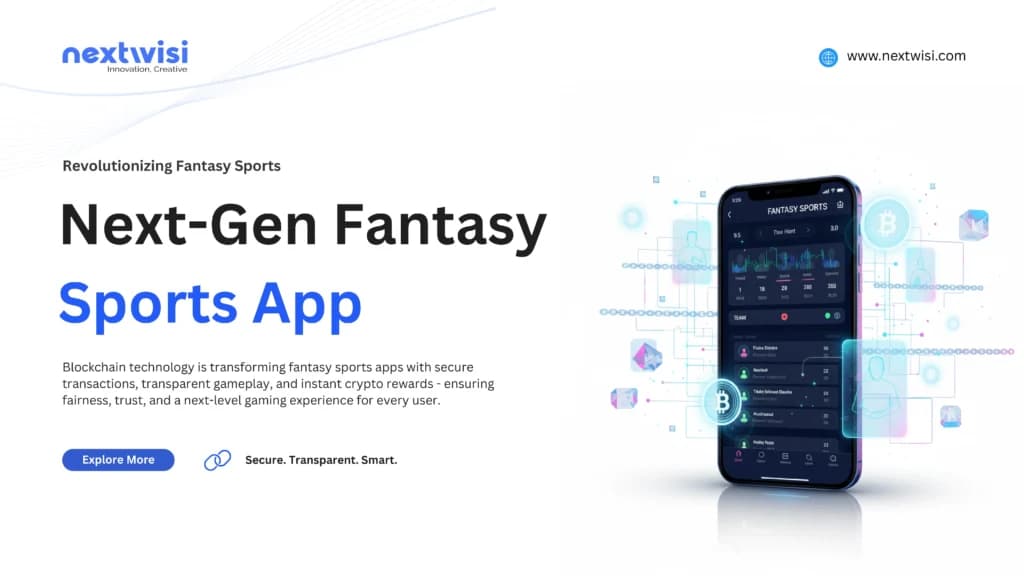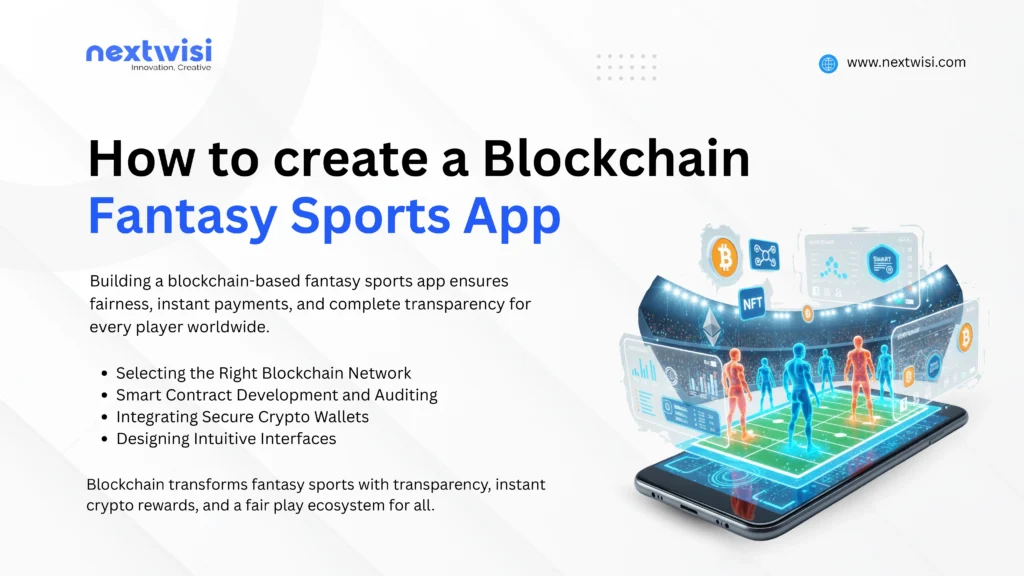By anil
10/29/2025

Discover how blockchain in fantasy sports apps ensures fairness, faster transactions, and trusted digital gameplay for every user.
Fantasy sports app have become a major ecosystem with multibillion-dollar consequences and have come out of small community games. The virtual teams are now created by millions of users, real-time leagues are being competed in, and tangible rewards are being earned. However, the old fantasy platforms continue to experience late payments, internal security issues, and lack of trust. All these issues are based on the idea of centralized control, meaning that a single company processes all data, scores, and finances.
Integrating blockchain in fantasy sports app development will bring forth transparency and decentralization. All transactions and regulations are stored in an unalterable digital registry, minimize the possibility of manipulation, and can be automatically paid in smart contracts. To players, it signifies certain results and instant access to wins; to developers, it signifies increased confidence and scalability. This assortment of security, mechanization, and transparency is establishing a fresh worldwide pattern of just and compensating fantasy gaming.
Blockchain is a decentralized web of interconnecting nodes, which contain the same replicas of a digital registry. Every transaction that can be documented in this ledger is authenticated by consensus, and it is practically impossible to modify or forge it. The technology is changing the way data, rewards, and user interactions are managed in fantasy sports app.
In conventional apps, match results, leaderboards, and transactions are controlled by administrators, usually through closed systems. Conversely, blockchain stores all such data in an open manner to allow players to self-audit results. Smart contracts are self-executing code segments that make sure that rules related to contests are automatically enforced without human intervention. The results are processed and the rewards transferred immediately after a game is over. Such non-liquidity removes any chance of prejudice, enhances equity, and gives the user a hundred percent trust that all activities in the app are governed by the same checked guideline.
It is crucial to note that prior to the realization of the advantages of blockchain, it is crucial to understand the unabated problems in the existing fantasy programs.
Lack of Transparency: The majority of available platforms have undercover algorithms to compute scores and payments. Players cannot be assured of fair or manipulated outcomes, and it breeds doubts and mistrust that is detrimental to user retention.
Slow and Costly Payments: Traditional systems rely on banks or pay processors. It not only increases transaction costs but can also take days to withdraw, which is annoying to the users who want fast digital payouts.
Data Breaches and Privacy Risk: Sensitive data is stored in centralized servers, including emails, payment data, and KYC data. Even one security breach will result in the loss of thousands of users and the credibility of the platform in a few hours.
Fake Users and Bots: The use of automated accounts prevails in the competitions and in the distortion of standings. Authentic participants are disadvantaged, and platforms are not well-known. It is almost impossible to solve these systemic problems in centralized models – and so blockchain is the logical next step of fairness and security.
The decentralized nature of blockchain specifically eliminates the weaknesses of traditional fantasy platforms that had existed.
Decentralization and Fair Play: Blockchain does not require a central authority, but it disperses control throughout the network. All the rules and winners of the contests are recorded on-chain right in the open. Smart contracts are used to automatically impose the rules in such a way that the administrators or any other parties cannot alter the outcomes when a contest is underway.
Transparent and Instant Transactions: The peer-to-peer transaction model means that blockchain allows direct payouts to the players and the platform. Gambling payouts are automatically given immediately without being manually verified, and a transaction history is available forever to verify. This eliminates the secret expenses and develops robust financial trust.
Increased Security and Privacy: All the data blocks are encrypted and connected to the one before, and thus manipulation cannot be done easily without authorization. Identity solutions based on blockchain may anonymize user data and minimize exposures in the event of a breach.
Authentication and Anti-Bot Protection: Digital identity certificates by blockchain would guarantee the use of legitimate players. Checks produced by AI and cryptographic evidence ensure that no fake accounts are detected, and platforms have a level playing field and integrity.
Non-fungible tokens (NFTs) have established a brand-new ownership concept in fantasy sports apps. These are distinct digital tokens that enable the player to have collectible cards, team logos, or even virtual likenesses of actual players.
True Ownership and Tradeable Assets: NFTs can be stored in the crypto wallet of the player, unlike centralized collectibles, which are stored on company servers. The blockchain records ownership, which ensures authenticity and no duplication. These assets are tradeable, sellable, or rentable by players in secondary markets, meaning that they generate new sources of revenue and forms of engagement.
Play-to-Earn (P2E) Integration: Blockchain also allows the creation of dynamic economic models that allow players to earn tokens or cryptocurrency according to their performance. One of the users who wins a contest is automatically rewarded with tokenized reinforcements, which can be traded or invested back. This form of play-to-earn approach keeps players interested and transforms gaming abilities into real income streams, which increases retention and loyalty.

A multi-stage approach entailed in the development of a successful fantasy platform using blockchain should be careful.
Selecting the Right Blockchain Network: The various chains have their benefits. Ethernet works with high-level smart contracts and NFTs, Polygon has lower transaction fees and faster charges, and Solana allows real-time updates, which are suitable in sporting events. The correct selection of a network influences scalability and cost of users.
Smart Contract Development and Auditing: Smart contracts dictate all the contest registration and scoring and even distribution of prizes. These have to be coded accurately, and careful auditing has to be done by cybersecurity professionals to remove bugs or loopholes that may be used by bad actors.
Integrating Secure Crypto Wallets: Players can store tokens and win through wallets like MetaMask, Trust Wallet, or Coinbase Wallet. A wallet experience without any friction is needed to allow mainstream users to transact without understanding how to use blockchain.
Designing Intuitive Interfaces: The most sophisticated blockchain systems should still be easy to use. A homelike interface based on clean navigation, responsive dashboards, and clear reward summaries ensures that the technical complexity is hidden behind the attractive visuals and smooth functionality.
Blockchain and fantasy sports App are only starting to intersect, and their direction leads to the creation of a completely decentralized entertainment system. On-chain rewards will be real-time, with future platforms connecting with real-world sports events and allowing them to trigger real-world sports events.
Players will be involved in community-managed frameworks in the form of Decentralized Autonomous Organizations (DAOs), whereby users vote as a block on the type of contest or the type of charges. NFTs and player tokens will be able to flow freely into and out of ecosystems to create a borderless sports economy, with interoperability between blockchains.
With a change in regulations and mainstream adoption, it will likely see an explosion of hybrid designs that involve fiat and crypto to make onboarding easier. Eventually, blockchain will transform fantasy sports app to provably fair ecosystems where all players, developers, and sponsors will act under transparent and verifiable conditions.
The application of blockchain in fantasy sports app development represents more than a technological upgrade but a revolution of the ways in which fairness and ownership, as well as interaction, are characterized. Blockchain will remove manipulation, speed up the exchange, and bring transparency to every action, and NFTs and smart contracts are unrestricted in their opportunities to gain profit and innovation.
Businesses require a stable technology partner in order to bring these breakthroughs into reality. Nextwisi Solutions is an IT firm that focuses on blockchain development, mobile application development, AI agent development, cloud solutions, etc. Nextwisi Solutions has creative, scalable, and trusted fantasy sports platforms, which are developed by skilled iOS and blockchain developers.
Regardless of whether you are releasing a new fantasy sports app based on blockchain or are renovating an existing app, Nextwisi deliver’s end-to-end solutions, including concept development to launch, to ensure that your brand sets itself apart as the next digital revolution in the field of fantasy gaming.